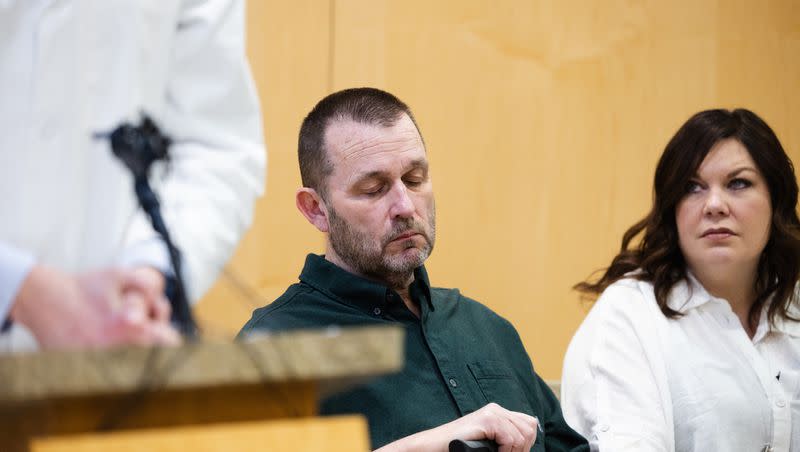Doctors use radiation to treat Utah man's heart condition in new lifesaving procedure

Shannon Brooks was at a point where he did not have many options to treat his heart condition besides a transplant; but Intermountain Health doctors identified him as a good candidate for a new method to address heart arrhythmia: radiation.
It took a lot of collaboration, with doctors from different areas of Intermountain Medical Center sharing their expertise to bring radiation used to treat cancer into a noninvasive heart procedure.
Brooks is the second person at Intermountain Health to receive radiation treatments for a heart condition, and it is one of few places the treatment is available. He said the doctors were amazing at putting together a treatment strategy for him as a team.
"It's made a huge difference in my life. I'm the father of four and I have three grandkids — and it's just amazing to be able to be back with them again," he said.
Brooks' heart
His wife, Jen Brooks, said they are very grateful for this opportunity, which made a heart transplant a backup option instead of their only option. She said her husband was able to resume normal activities again soon after the procedure. This was life-changing for their family, and allowed her and her husband to reach their 30th wedding anniversary.
"We were feeling pretty hopeless and this procedure brought us a new perspective. We're so grateful," said Jen Brooks. "This could have been a different story."
Shannon Brooks said he had a heart attack in 2004. He started having problems again in 2017 and doctors performed a catheter ablation. He did well for five years until his defibrillator went off early Christmas morning, and then a week later he went into cardiac arrest on New Year's Day and his son performed CPR on him. For the next month, he was hospitalized multiple times and needed treatment for refractory ventricular tachycardia.
Brooks' doctor, Dr. Michael Cutler with the Intermountain Health heart and vascular program, said this treatment is a solution for people with heart failure who have a high risk for life-threatening arrhythmias but the typical treatments don't work.
He said first they give patients medications, and if those are not successful they perform a catheter ablation — inserting a small catheter into the heart and burning tissues that are suspected to be causing the problems. These steps typically resolve the issue.
For Brooks, Cutler said the way his heart had declined made them seriously question whether a repeated catheter ablation could make things worse and do more harm than good. Additionally, his previous heart attack meant that there was a scar that is more easily identified — so it is more easily treated by radiation.
Both radiation and a catheter ablation use energy to damage cells that are causing abnormal heartbeats. A catheter ablation uses heat rather than radiation, but both are different methods of the same treatment, Cutler explained.
The procedure
Dr. Peter Hu, medical director of cardiac molecular imaging, helped to plan the procedure, and said they used multiple types of imaging to isolate the scar they think was causing the arrhythmia in Brooks' heart and determine the best treatment strategy.
"A lot of planning, a lot of teamwork. This was a successful collaboration," he said.
Radiation oncologist Dr. Grant Hunter said his role was to hit the target identified by Hu and Cutler with a very high dose of radiation. The procedure is known as stereotactic radiotherapy. He said Brooks was on the table for about 15 or 20 minutes, and then was able to go directly home, with few side effects, including feeling tired and inflammation.
"It's a very noninvasive method to deliver potentially lifesaving treatment for these patients," Hunter said.
He said they use multiple different beam angles to target one area, and the cumulative effect of the radiation is to create a scar that stops the function of the targeted cells. The treatments have been so successful because of work from cardiologists determining which patients would benefit most from the treatment, Hunter said
Brooks said it was crazy how many doctors were helping care for him, and he is grateful for them.
"You could tell they work hard for all of their patients and care for them. I knew they knew what they were doing," he said.
Future use of radiation in cardiology
Although the procedure has been very successful and is exciting, Cutler said at this point the team anticipates using it just a few times a year. He said it is an advanced therapy that is still new and is only used after other options have failed.
Medications and a catheter ablation will still be the first treatment, as they have successfully helped hundreds of thousands of patients, and there is significant data showing that they work.
In addition to the limited data, radiation also cannot target as precise of an area as catheter ablation.
Although radiation could become more precise in the future, for now Cutler said doctors need to balance the risk with the benefit for each case.
"It's early on, and so there's a lot to learn. And I think it's always important to take a measured approach," he said.
Cutler said a few years ago he had a patient who had repeated issues and doctors were out of treatment options, and the patient ultimately died. He said this was frustrating and led him to look for other treatment options to make available at Intermountain Health.
"That's really what kind of triggered us starting down the road or the process of having these conversations, working in a collaborative effort. And bringing this treatment option to (Intermountain)," Cutler said.

